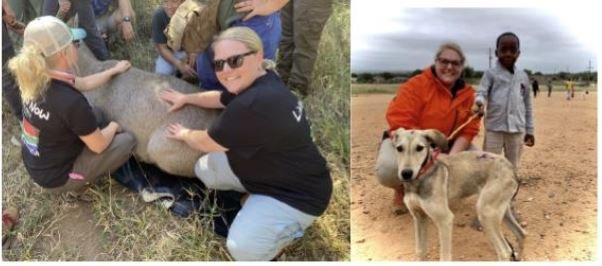Posted: August 14, 2023
Dr. Jennifer Koehl, assistant teaching professor and Program Coordinator for Veterinary and Biomedical Sciences, spent two weeks in South Africa studying wildlife medicine and providing care to both domestic and wild animals. Dr. Koehl is a small animal practitioner interested in One Health education. She is the One Health Minor Coordinator for the Veterinary and Biomedical Sciences Department.

Dr. Jennifer Koehl in South Africa
During her stay, she spent several days at Moholoholo Animal Rehabilitation Centre learning about wildlife husbandry, neonate care, and toxin treatment across multiple species. She assisted in necropsies of impala and birds of prey as well as the 8th most venomous snake in the world, a Boomslang. Because intentional poisonings of poached carcasses are a major killer of predators and scavengers, much time at Moholoholo was dedicated to care of raptors.
Dr. Koehl also visited Kruger National Park and received instruction from multiple state veterinarians on conservation medicine, poaching, elephant overpopulation, and Foot and Mouth Disease (FMD). FMD is a reportable disease in the United States. The uniqueness of South Africa’s wildlife preserves, and fencing creates both boundaries and migratory challenges for wildlife.
Wild game capture is a large portion of wildlife veterinary medicine. Dr. Koehl received instruction on different kinds of chemical restraint used across the species. She practiced darting animals from a helicopter and helped dart captured Nyala for preserve relocation. Working with the state veterinarian, she tracked darted antelope through the African bush. Once located, she put her large animal skills to practice by monitoring anesthesia and decompressing the rumen of a bull Kudu before transporting and successfully releasing him to another preserve.
Finally, a day was spent with the Hoedspruit Animal Outreach (HALO) in a village in northern South Africa. Dr. Koehl co-lead a team of veterinary students and undergraduates in a mass zoonotic disease vaccination and parasite management event for village dogs used for hunting and companionship. Over 100 dogs were vaccinated against Rabies, dewormed, and treated for ticks. Dogs are the source for 99% of human Rabies cases. Dr. Koehl intends to return to Africa with students in the future.

